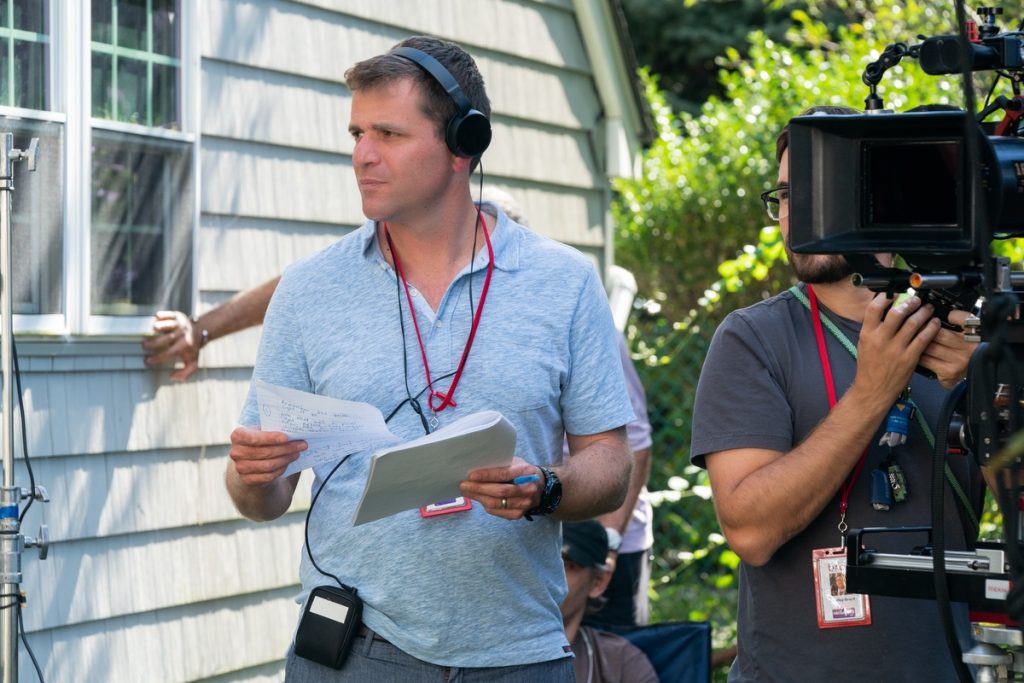“I was obsessed with comedy writing as a kid,” said Nicholas Stoller. “I remember watching Saturday Night Live and not wanting to be the actors, but wanting to write the sketches. I don’t even know how I knew that was a job.”
As a screenwriter, Stoller has credits for Fun with Dick and Jane, Yes Man, Get Him to the Greek, The Muppets, Sex Tape, The Carmichael Show, Night School and Bros, many of which he also Directed, including Neighbors and Forgetting Sarah Marshall.
“I’m excited Bros is going to be theatrically released, but a weird thing happened a few years ago where [studios] were like, ‘Comedies don’t work in theaters.’ Which is not true. Judd [Apatow] always says, ‘If The Hangover came out this weekend, it would make a billion dollars.’”
For whatever reason, studios just stopped making as many theatrical comedies. They’ve instead gone to television, limited series, and leaned into action comedies for a broader, global appeal. “I love going to see comedy in the movie theater. You get to have that experience with an audience, laughing and reacting.”
“People say it’s a business first, but it’s not run like a business. If anyone thought about it like a business, there’s a huge hole in the comedy department.”
R Vs. PG-14 Comedies
“The things that I write and the things that I write to direct are very different,” he said. “So when I’m writing for someone else, you are working for the director, ultimately. I try to do as good of a job as possible, but when writing to direct, I really have to be inside of it.”

Nicholas Stoller on the set of Bros. Photo by Nicole Rivelli/ Universal Pictures
Stoller’s latest comedy, the first gay romantic comedy ever made, is called Bros. The story follows two men with commitment problems who attempt a relationship. “I usually know from the beginning if it’s going to be R. I tend towards R just because people curse in real life and have sex in real and I like stuff to be honest.”
He’s also written PG-13 and the original Muppets movie he wrote with Jason Segel was actually G in the beginning, but the studios wanted them to make it PG. “That was funny because G actually hurts the audience. Little kids don’t want to see G,” he laughed. “It depends on the material.”
Some of these ratings, of course, are less relevant today. They’re more of a guideline for parents than any indication of what will happen upon release. “I don’t think it really matters anymore. It can help or hurt theatrical, if it’s a four quadrant family movie, but the more adult comedies, I think it helps to be R rated.”
For the latest comedy, the original idea came from Stoller. “I worked with Billy Eichner on Neighbors 2 and I cast him on a show called Friends from College that’s on Netflix. He was amazing in it. He played Fred Savage’s boyfriend and I discovered he was a really good actor.”
They screened the series in front of an audience and everytime Billy was on screen, the audience had a big reaction. “It destroyed. That doesn’t happen that often. He’s a movie star and he deserves a comedy vehicle.” Stoller is straight, but he’s been interested in making this comedy for years.
The First Gay Rom-Com
“I’m straight, so it didn’t feel like my story to tell, but my tone with that story could be interesting. So I approached Billy about building a movie around him and we started working together. After about a year cracking the story, I called Judd (read our interview with Judd Apatow here). He was excited, so we took it to the studio.”
The biggest surprise, of course, is that this didn’t come sooner. “I was never that worried, because if you’re honest in the story you’re telling, the audience goes along with you. The audience reacts poorly when you’re trying to shock them. I knew tonally, it just needed to be honest.”
They screened the movie to audiences and nothing ever felt too far. “It felt like the audience was ready for this movie. It’s just crazy it took so long to get made. It’s cool its the first one, but it’s not great,” he joked. “Tonally, it will feel like my other movies, but it’s also its own thing.”

Edgar (Guillermo Díaz), Tina (Monica Raymund) and Bobby (Billy Eichner) Photo by Nicole Rivelli/ Universal Pictures
To get into the headspace to make this movie, Stoller went on a “gay cinema tour” to see if any genre specifics needed to be met. “There was basically only one movie I watched that [felt similar]. There’s a movie called Trick (1999). Small movie from the 90s. It’s an indie, so it’s different, but it’s just like a crazy night out story. It was the only one that was light and fun. Everything else was a bummer or just very serious.”
With this in mind, they also poked fun at movies where a gay character is added essentially for cosmetic reasons, rather than a true character with depth.
Billy Eichner, the Character
“It was very important to Billy, because his whole career has been explaining who he is, over and over again. So it was important that he explain to the audience. At the beginning, he pitches a romantic comedy to the Executive and the Executive doesn’t know what he’s talking about.”
Despite the significance of being first, the writer/director approached it like any of his movies. “The more specific you are to the character, the more relatable, or universal your movie is. I wasn’t consciously trying to avoid tropes, but the more specific you are, the more tropes you avoid.”
As for Billy, Stoller said, “He knows exactly what makes him funny and what makes him vulnerable. Then when we cast Luke Macfarlane, we made it specific for him. It was just about being specific. My job is just to make every character as human as possible.”
Since most people who recognize Billy recognize him as being a loud character (Billy on the Street, Parks and Rec), they wanted him to show who he actually is in this movie, along with Friends from College.
“In Friends from College, he plays an almost quiet, fertility doctor, very different from anything he had ever done. There’s one moment where he had to yell and I could tell he didn’t want to do it. He wanted to avoid the yelling guy.”
In Bros, Billy plays Bobby. “It’s as close to who Billy is as a person. It was important to us that the movie be very adult, not in content, but in terms of being sophisticated. It’s basically two guys talking to each other for two hours. Funny stuff happens, but that’s it. And it was important to him that he not be a mess.”
Another trope would be that the character is an absolute mess who can’t get his life together to find love and he needs a “clean up montage.” Bobby, on the other hand, is very organized but has been focused on his career rather than love. So the movie is about removing these walls.
Writing Partnerships
“[Billy] and I wrote together and this is kind of the way I’ve always done it: we crack the story together and talk through the story over many months. And then, we split up pages and wrote scenes separately.”
Stoller said for this movie, Billy probably wrote more than he did, but his partnerships — Jason Segel or John Hamburg — are often fifty-fifty. “Then we would come together, rewrite each others’ pages, and then it’s back and forth. The writing process never really ends because you discover stuff at the table read, get stuff from the studio, get notes from Judd, and we adjust.”
“The only person that I literally sit and write with is my wife Francesca (Friends from College). Jason Segel and I break up the story, talk through the story, and then send each other pages. It’s kind of easier to talk through the story and write up the story than to sit and write together.”
Stoller enjoys collaborating with actors like Segel and Eichner. “Naturally, I’m looking at more of a plot perspective than character perspective and the actor will say, ‘Yea but would a human do that?’ It’s a very simple question but as a writer you can forget. Or, ‘But why am I walking out on the balcony—there’s no reason for that?’”
With this in mind, Stoller likes Paul Schrader’s perspective where you don’t really know the story until you can tell it to someone for 45 minutes straight (read our interview with Paul Schrader here). “If you can’t tell the story, then you have problems.”
Confidence through Comedy
“I’ll write stuff simply to amuse myself, that I know won’t be in the movie, ever. Billy and I have different writing styles. I’ve found writers seem to be one kind of the other: I write a million shitty drafts. I just write draft after draft and slowly it gets better. He takes a while to write a perfect scene. I think our weird combination made it work.”

Aaron (Luke Macfarlane) and Bobby (Billy Eichner) Photo by Nicole Rivelli/ Universal Pictures
The screenwriter admits that writing can be boring, so the best way is to “write from truth.” He said, “So often, I’m like, it would be funny if he just shit his pants here, and that never ends up in the movie, but I write weird jokes and left turns. You do discover stuff that way too.”
“When you put it on its feet, you know if it works. The audience is going to laugh at whatever is most honest, most true, most relatable. It’s just a fact. They’re the biggest laughs in the movies I’ve made, with a few exceptions.”
From the director’s chair, Stoller said this movie had less improv than his other works. “I don’t like the riffy feeling. It takes me out of the movie,” he said of excessive improv. “Some actors don’t like to improv, so I might give them new jokes, but actors good at improv, I give them an area to improv in, like ‘Say something in this zone.’ I also use it to create naturalistic performances just to see if it makes the break-up feel more real.”
Across the board, Stoller said most of his movies around twenty percent improv or jokes pitched on set and the rest come from the script. This film, in particular, was more from the script.
Screenwriting Breakthroughs – The Re-outline Phase
“The big thing I learned in screenwriting that cracked the whole art form open for me was re-outlining. You write your script as fast as you can and then you have this long draft where it’s too much to do notes — 120 pages or more — and then I re-outline. Looking at that outline is so much more useful than looking at a whole script.”
This new outline would inevitably be different from the original outline and it would give Stoller a place to start over from. “I did not invent this, but it’s something that really really helps. I’ve also started carding everything. The visual nature of cards unlocks something in your brain to figure out what’s repetitive, what can be moved around.”
Stoller somewhat overwrites his scripts and then wittles it down. He said the original draft of Forgetting Sarah Marshall was too long and Judd Apatow told him, “The script isn’t the movie. The script is just the parts that you’re going to build the movie out of. Different writers have different approaches, but with comedy, you don’t know exactly what you’re going to need. Over and over again, I’m surprised at what I need in post.”
During the re-outline phase, Stoller does occasionally refer to Syd Field and other practical goal posts. “You really just want to turn everything into small increments. Another thing that really changed my writing. Years ago, I had a drink with Nora Ephron (When Harry Met Sally, Sleepless in Seattle) and she told me something she had learned from Mike Nichols (The Graduate, The Birdcage).”
The lesson Nora Ephron taught him was to split the film up into eight chapters. “So the first act is two chapters. The second act is four chapters. The third act is two chapters. And, each chapter, the story has to completely change. This lesson was really mind-blowing for me. Whenever I’m reading a script that feels repetitive it’s because the story isn’t totally changing.”
Stoller said almost any movie can be broken up this way. For example, in Forgetting Sarah Marshall, the story changes would be
1. He gets dumped,
2. He goes to Hawaii,
3. He sees Sarah and decides he’s going to stay, then
4. He meets Mila Kunis. “So each one is a complete change. They should be different. If not, your story is not evolving. The story always needs to be changing.”
This interview has been condensed. Listen to the full audio version here.

